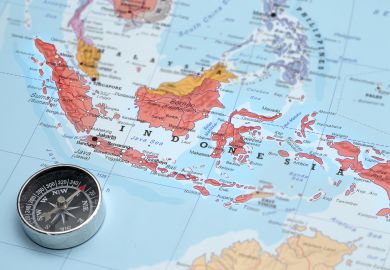Of all the countries in the world, Indonesia saw the quality of its research decline by the greatest amount between 2011 and 2015, according to citation analysis published in Times Higher Education in February. While the nation’s output of papers in Scopus-indexed journals grew by 137 per cent during that period, those papers’ average field-weighted citation impact – their citation counts adjusted for disciplinary norms – decreased by 15 per cent.
That huge increase in output is partly down to government policy. For many years, the Ministry of Research, Technology and Higher Education’s regulations governing academic promotion, by which all Indonesian universities must abide, have awarded extra points for publication in international journals. Previously, these journals were defined as, among other things, being in English and having editorial boards drawn from multiple countries. Then, in 2014, the definition was tightened up to take in certain quality thresholds, such as being indexed by Scopus (the main focus) or the Web of Science, having an impact factor of at least 0.1, or being in at least the third quartile of journals in the Scimago Journal and Country Rank.
The ministry also incentivises researchers to aim high by offering direct cash bonuses for higher-quality publications. Papers published in journals with certain impact factors, and that garner a certain number of citations, can yield the researcher a reward of Rp100 million (£6,000). In 2016, more than 500 Indonesian researchers received such amounts. Several universities also provide similar incentives.
Meanwhile, in January, the ministry issued a new regulation governing the salary top-up – known as the “professional allowance” – that it provides to academics who pass its regular “faculty certification” assessment. Historically, this monthly allowance has been provided to all academics from lecturers upward, at both public and private institutions. However, the new regulation imposes additional publication criteria for associate and full professors. If they fail to meet these targets, the intention is that their allowances will be cut.
For associate professors, the threshold is a minimum of three publications in accredited national journals or one in an international journal every three years. Professors must have at least three publications accepted by international journals in the same period, or one paper accepted by a journal that scores highest in the promotion criteria mentioned above.
The regulation is aimed at further increasing Indonesian academics’ output, in the hope of developing a sound research and publication culture. Once it becomes embedded, the ministry may focus its target more closely on quality, requiring everyone to publish in international journals defined by the new, more rigorous criteria.
Despite the ministry’s recent clarification that failure to meet the new targets will see professional allowances reduced by only 25 per cent, rather than being cut entirely, the Indonesian parliament remains uneasy about the burden that the move will impose on professors in particular. It is not uncommon for some to publish no research papers at all once they achieve that rank.
Some members of parliament also point to the limited amount of research funding on offer to Indonesian researchers – particularly given the high publication fees that some international open access journals charge. This is a very serious point. The ministry offers competitive grants, but only about 15,000 were given out in 2016 – worth a total of about £80 million. As a comparison, consider that there were approximately 120,000 Indonesian academics in 2015. So, every year, one grant is given out for every 13 academics.
Nor are universities able to provide much in the way of research funding from their own coffers, so most Indonesian faculty are left to try to conduct international-standard research with no funding at all.
Parliamentarians have urged the ministry to engage in further consultation before it starts cutting allowances on the basis of the new regulation, so it is unclear when the mechanism will come into effect. A pause does seem wise. Targets and incentives, carrots and sticks are all very well, but if they are not realistically achievable, they are merely a source of angst – and, potentially, a driver of research misconduct.
Martin Surya Mulyadi is a senior lecturer in accounting and finance at BINUS University, in Jakarta, Indonesia. He is currently doing a doctorate in corporate governance at Bond University, in Australia.
Register to continue
Why register?
- Registration is free and only takes a moment
- Once registered, you can read 3 articles a month
- Sign up for our newsletter
Subscribe
Or subscribe for unlimited access to:
- Unlimited access to news, views, insights & reviews
- Digital editions
- Digital access to THE’s university and college rankings analysis
Already registered or a current subscriber?






